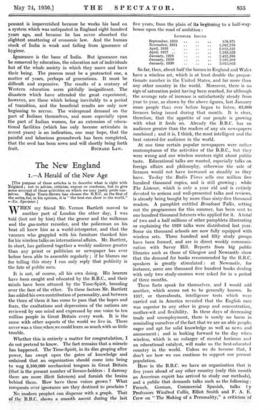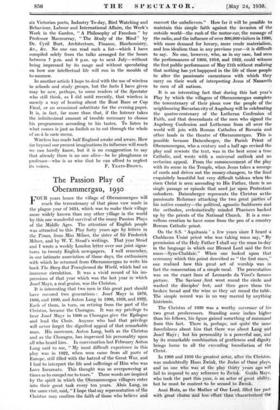The New England
x.—A Herald of the New Age [The purpose of these articles is to describe what is right with :Vngland ; not to advise, criticize, expose or condemn, but to give some account of those activities on which we may justly pride our- $elves. Major Yeats-Brown has chosen the B.B.C., as the first of the series, for, in his opinion, it is " the best-run show in the world.'! O--En. Spectator.] WHEN my friend Mr. Vernon Bartlett moved to another part of London the other day, I was told (but not by him) that the grocer and the milkman and the gas-meter recorder, and the policeman on his beat all knew him as a world-interpreter, and that the vanmen who grappled with his furniture thanked him for his wireless talks on international affairs. Mr. Bartlett, in short, has gathered together a weekly audience greater than any priest or politician or newspaper has ever before, been able to assemble regularly ; if he blames me for telling this story I can only reply that publicity is the fate of public men.
It is not, of course, all his own doing. His hearers have been caught and educated by the B.B.C., and their minds have been attuned by the Time-Spirit, brooding over the face of the ether. To these factors Mr. Bartlett has added his own contribution of personality, and between the three of them it has come to pass that the hopes and fears, the exaltations and depressions of the nations are reviewed by one mind and expressed by one voice to ten million people in Great Britain every week. It is 'the same with other aspects of the world we live in. There never was a time.whenwe could learn so much with so little trouble.
Whether this is entirely a matter for congratulation, I do not pretend to know. The fact remains that a miracle has happened. The Time-Spirit, in its dim groping after power, has swept open the gates of knowledge and ordained that an organization should come into being to wag 3,100,000 mechanical tongues in Great Britain that is the present number of licence-holders : I daresay there are more illicit listeners) and furnish the brains behind them. HoW haYe these' voices grown ?' What conquests over ignorance are they destined to proclaim ? _ No modern prophet ean dispense with a graph. That . a the B.B.C. shows a smooth ascent iluring the fait five years, from the plain of its beginning to a half-way- house upon the road of ambition :
LICENCES ISSUED
September, 1923. ..
• 158,871
November, 1924 ..
1,082,270
April, 1926
2,012,252
April, 1927 ..
2,289,529
January, 1928
• • 2,432,386
January,"1029
. • 2,685,303 • January, 1930 • • • • .. -3,025,033
So far, then, about half the homes in England and Wales have a wireless Set, which is' at least' double the propor- tionate number in the United States, and far more than any other country in the world. Moreover, there is no sign of saturation point having been reached, for although the average rate of increase is satisfactorily' steady from year to year, as shown by the above figures, last January more people than ever before began to listen, 65,000 licences being issued during that month. It is clear, therefore, that the appetite of our people is growing with what it feeds on. Already the B.B.C. has an audience greater than the readers of any six newspapers combined ; and it is, I think, the most intelligent and the best catered-for audience in the world.
At one time certain popular newspapers were rather contemptuous of the activities of the B.B.C., but they were wrong and our wireless mentors right about public taste. Educational talks are wanted, especially talks on foreign affairs and philosophy, otherwise the sale -of licences would not have increased as steadily as they have. To-day the Radio Times sells one million five hundred thousand copies, and is still growing ; while The Listener, which is only a year old and is entirely devoted to 6erious and well-presented talks and reviews, is already being bought by more than sixty-five thousand readers. A pamphlet entitled Broadcast Talks, setting out the programmes for this summer, has been' sent to one hundred thousand listeners who applied for it. A total of two and a half millions of other pamphlets illustrating or explaining the 1929 talks were distributed last year. Some six thousand schools are now fully equipped with wireless sets. Three hundred and fifty study groups have been formed, and are in direct weekly communi- cation with Savoy Hill. Reports from big public libraries such as those of Glasgow and Newcastle show that the demand for books recommended by the. B.B.C. speakers is greatly stimulated : at Newcastle, for instance, some one thousand five hundred books dealing with only two study-courses were asked for in a period of three months.
These facts speak for themselves, and I would add another, which seems not to be generally known. In 1917, or thereabouts, intelligence tests which were carried out in America revealed that the English race was superior to any other in grasp and concentration, mother-wit and flexibility. In these days of decreasing trade and unemployment, there is surely no harm in reminding ourselves of the fact that we are an able people; eager and apt for solid knowledge as well as news and amusement ; and in looking forward to the day when wireless, which is an enlarger of mental horizons' and an educational catalyst, will make us the best-educated country in the world. Unless we do become that, I don't see how we can continue to support our present population. Here in the B.B.C. we have an organization that is five years ahead of any other country (only this month an American expert has arrived to study our Methods), and a public that demands talks such as the following : French, German, Commereial Spanish, talks t y ProfeSichs Winifred Cullis, Elliot Smith and F. A. E. Crew on " The Making of a Personality," a criticism 'of
"
six Victorian poets, Industry To-day, Bird Watching and Behaviour, Labour and International Affairs, the Week's Work in the Garden, " A Philosophy of Freedom " by Professor Macmurray, " The Study of the Mind" by Dr. Cyril Burt, Architecture,. Finance, Biochemistry, . &c., &c. No one can read such a list—which I have compiled solely from the talks arranged for the hours between 7 p.m. and 9 p.m. up to next July—without being impressed by its range and without speculating on how our intellectual life will run in the moulds of to-morrow.
In another article I hope to deal with the use of wireless in schools and study groups, but the facts I have given may be new, perhaps, to some readers of the Spectator who still think, as I did until recently, that wireless is merely a way of hearing about the Boat Race or. Cup Final, or an occasional substitute for the evening paper. It is, in fact, far more than that, if the listener takes the infinitesimal amount of trouble necessary to choose his programmes according to his tastes. To listen to what comes is just as foolish as to eat through the whole of an a la carte menu.
Wireless has made half England awake and aware. How far beybrid our present imaginations its influence will reach we, can hardly know, but it is no exaggeration to say that already there is no one alive—be he ploughman or professor—who is so wise that he can afford to neglect







































 Previous page
Previous page